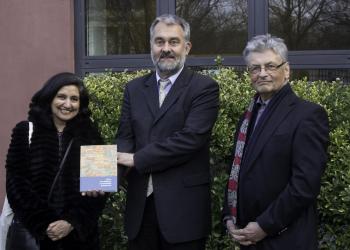Berlin meeting highlights expanding recognition of religious contributions to sustainable development
In a sign of the growing awareness of the role that religious groups can play in sustainable development, the German international development agency has undertaken a new initiative to improve cooperation with diverse religious leaders and their communities.
The initiative, known as the International Partnership on Religion and Sustainable Development, was launched at an international conference here on 17-18 February 2016.
Sponsored by the German Federal Ministry for Economic Development and Cooperation (BMZ), the event featured the participation of more than 100 development specialists, government officials, and religious leaders, including representatives of the Baha’i Faith.
According to German officials, the purpose of the partnership – a joint endeavor with development agencies of the United Nations, the United States, the United Kingdom, Sweden and others, including the World Bank – is to develop common ideas on how to improve cooperation with faith communities.
“Without the involvement of the world's religions, we will not be able to meet the challenges the world is facing,” said Gerd Müller, Minister of the BMZ. “Especially in these times when religion is used as an argument to justify terrorism and violence, we need to improve cooperation with all religious communities. We must not leave the field clear for the extremists. Rather, we need to strengthen those who are working for peace and development.”
Among those invited was Bani Dugal, the principal representative of the Baha’i International Community to the United Nations, who contributed to a new book that was launched in conjunction with the conference.
That book, “Voices from Religions on Sustainable Development,” which was published by the Ministry, featured chapters from leaders representing the world’s major religions on how their faith approaches sustainable development.
Ms. Dugal said one theme that emerged from the conference was the degree to which international development agencies have begun to see religious organizations as more than merely on-the-ground service providers.
“People were talking about how religions have the power to inspire and that they can also inform the way policy is created for development work,” said Ms. Dugal.
Ulrich Nitzchke, head of the recently created program on Values, Religion and Development at Germany’s national development agency, GIZ, said that for many in the field of international development, “religion was a blank spot.”
“We had never discovered religion as a source of values for values-driven development,” said Mr. Nitzchke, noting that sustainability is a “values term itself.”
Further remarks of Mr. Nitszche and Ms. Dugal about the Berlin conference can be heard in a short video, here.
